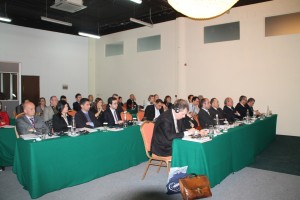Seminar on Social Dialogue by UĦM and EZA
 In a seminar organised by UĦM and EZA, Europäischen Zentrum für Arbeitnehmerfragen (the European Centre for Workers’ Questions) on the 14th and 15th of March, participants from 10 European countries discussed this year’s chosen theme: The Social Dialogue.
In a seminar organised by UĦM and EZA, Europäischen Zentrum für Arbeitnehmerfragen (the European Centre for Workers’ Questions) on the 14th and 15th of March, participants from 10 European countries discussed this year’s chosen theme: The Social Dialogue.
The discussion was triggered by the fact that the process enhancing Social Dialogue has a history dating back 20 years. Notwithstanding the fact that social dialogue has now become common practice within the EU social partners participating in the EZA Seminar, held at the Grand Hotel Excelsior in Valletta, have warned against it being taken for granted. It was agreed that social dialogue is a reflection of true democracy and promotes the principle of subsidiarity.
During the seminar UĦM’s General Secretary, Mr Josef Vella, quoted, EU’s Commissioner for Employment, Social Affairs and Inclusion, Mr Laslo Andor’s, statement regarding social dialogue when he said: “Its particular innovation, as we now know, was to propose a specific consultation and negotiation procedure which gave the European Social Partners a stronger role in framing and applying Community social policy. It also provided the Social Partners with a greater legitimacy through their new right to be consulted on proposed Community action, and to request the Council to implement their agreements through Directives.”
It was discussed how Social Dialogue has many aspects which we have to consider simultaneously, in the process of putting it in practice. In brief the Seminar speakers described Social Dialogue as follows:
- Dott. PierGiorgio Sciacqua, Co-President EZA, referred to the values which should guide everyone against rigid structures while promoting a flexible attitude that favours social dialogue on the employment agenda. Ms. Rowistha Gottbehϋt, Secretary General EZA, argued that trade unions need to appeal to workers to retain trade unions as their primary vehicle for participation in the social dialogue process.
- Dott. Daniele Fantechi, a Consultant on EU funded projects, explained which tools and finances the EU is providing to make all this happen and promote social dialogue.
- Mr. Clyde Caruana, Lecturer of Economics at the University of Malta, stressed that social dialogue should not be an end in itself but a means to an end namely to ensure a better quality of life. Balancing both the effectiveness and the efficiency of this social dialogue process is crucial to the success of modern trade unions, he said.
Towards the seminar’s conclusion the participants had the opportunity to experience the effectiveness of social dialogue through a workshop on a small scale specifically organized for the participants to demonstrate that social dialogue can only be successful if we work together. The UĦM augurs that such an exercise can be staged on a national level to the benefit of workers, their families and employers.
The General Secretary Mr Vella concluded by thanking EZA, all the staff at UĦM , its members, AŻAD, all the participants at the seminar, the speakers and their interpreters for the great experience.